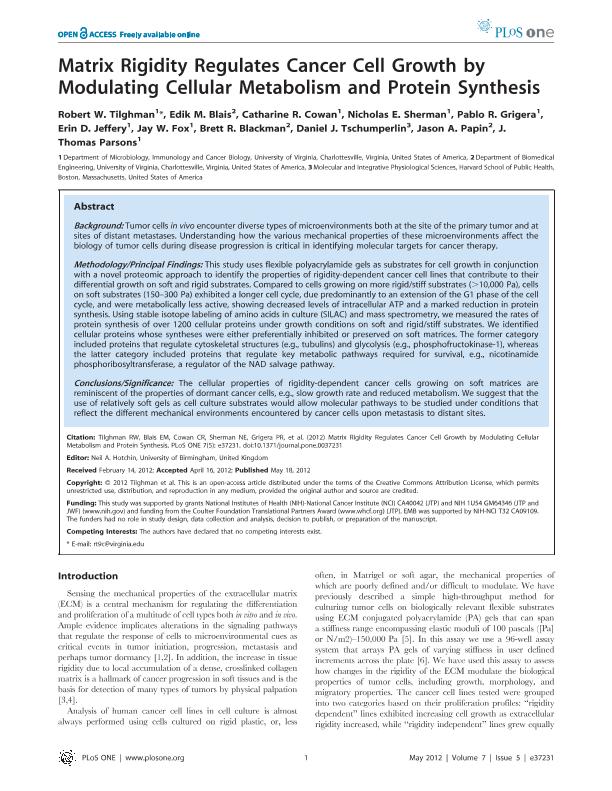Mostrar el registro sencillo del ítem
dc.contributor.author
Tilghman, Robert W.
dc.contributor.author
Blais, Edik M.
dc.contributor.author
Cowan, Catharine R.
dc.contributor.author
Sherman, Nicholas E.
dc.contributor.author
Grigera, Pablo Rafael

dc.contributor.author
Jeffery, Erin D.
dc.contributor.author
Fox, Jay W.
dc.contributor.author
Blackman, Brett R.
dc.contributor.author
Tschumperlin, Daniel J.
dc.contributor.author
Papin, Jason A.
dc.contributor.author
Parsons, J. Thomas
dc.date.available
2019-01-09T20:05:37Z
dc.date.issued
2012-05
dc.identifier.citation
Tilghman, Robert W.; Blais, Edik M.; Cowan, Catharine R.; Sherman, Nicholas E.; Grigera, Pablo Rafael; et al.; Matrix rigidity regulates cancer cell growth by modulating cellular metabolism and protein synthesis; Public Library of Science; Plos One; 7; 5; 5-2012; 1-11; e37231
dc.identifier.issn
1932-6203
dc.identifier.uri
http://hdl.handle.net/11336/67839
dc.description.abstract
Background: Tumor cells in vivo encounter diverse types of microenvironments both at the site of the primary tumor and at sites of distant metastases. Understanding how the various mechanical properties of these microenvironments affect the biology of tumor cells during disease progression is critical in identifying molecular targets for cancer therapy. Methodology/Principal Findings: This study uses flexible polyacrylamide gels as substrates for cell growth in conjunction with a novel proteomic approach to identify the properties of rigidity-dependent cancer cell lines that contribute to their differential growth on soft and rigid substrates. Compared to cells growing on more rigid/stiff substrates (>10,000 Pa), cells on soft substrates (150-300 Pa) exhibited a longer cell cycle, due predominantly to an extension of the G1 phase of the cell cycle, and were metabolically less active, showing decreased levels of intracellular ATP and a marked reduction in protein synthesis. Using stable isotope labeling of amino acids in culture (SILAC) and mass spectrometry, we measured the rates of protein synthesis of over 1200 cellular proteins under growth conditions on soft and rigid/stiff substrates. We identified cellular proteins whose syntheses were either preferentially inhibited or preserved on soft matrices. The former category included proteins that regulate cytoskeletal structures (e.g., tubulins) and glycolysis (e.g., phosphofructokinase-1), whereas the latter category included proteins that regulate key metabolic pathways required for survival, e.g., nicotinamide phosphoribosyltransferase, a regulator of the NAD salvage pathway. Conclusions/Significance: The cellular properties of rigidity-dependent cancer cells growing on soft matrices are reminiscent of the properties of dormant cancer cells, e.g., slow growth rate and reduced metabolism. We suggest that the use of relatively soft gels as cell culture substrates would allow molecular pathways to be studied under conditions that reflect the different mechanical environments encountered by cancer cells upon metastasis to distant sites.
dc.format
application/pdf
dc.language.iso
eng
dc.publisher
Public Library of Science

dc.rights
info:eu-repo/semantics/openAccess
dc.rights.uri
https://creativecommons.org/licenses/by-nc-sa/2.5/ar/
dc.subject
Matrix Rigidity
dc.subject
Cancer
dc.subject
Silac
dc.subject.classification
Otras Ciencias Biológicas

dc.subject.classification
Ciencias Biológicas

dc.subject.classification
CIENCIAS NATURALES Y EXACTAS

dc.title
Matrix rigidity regulates cancer cell growth by modulating cellular metabolism and protein synthesis
dc.type
info:eu-repo/semantics/article
dc.type
info:ar-repo/semantics/artículo
dc.type
info:eu-repo/semantics/publishedVersion
dc.date.updated
2019-01-09T17:47:03Z
dc.journal.volume
7
dc.journal.number
5
dc.journal.pagination
1-11; e37231
dc.journal.pais
Estados Unidos

dc.journal.ciudad
San Francisco
dc.description.fil
Fil: Tilghman, Robert W.. University of Virginia; Estados Unidos
dc.description.fil
Fil: Blais, Edik M.. University of Virginia; Estados Unidos
dc.description.fil
Fil: Cowan, Catharine R.. University of Virginia; Estados Unidos
dc.description.fil
Fil: Sherman, Nicholas E.. University of Virginia; Estados Unidos
dc.description.fil
Fil: Grigera, Pablo Rafael. University of Virginia; Estados Unidos. Consejo Nacional de Investigaciones Científicas y Técnicas. Oficina de Coordinación Administrativa Parque Centenario. Instituto de Ciencia y Tecnología "Dr. César Milstein". Fundación Pablo Cassará. Instituto de Ciencia y Tecnología ; Argentina
dc.description.fil
Fil: Jeffery, Erin D.. University of Virginia; Estados Unidos
dc.description.fil
Fil: Fox, Jay W.. University of Virginia; Estados Unidos
dc.description.fil
Fil: Blackman, Brett R.. University of Virginia; Estados Unidos
dc.description.fil
Fil: Tschumperlin, Daniel J.. Harvard Medical School; Estados Unidos
dc.description.fil
Fil: Papin, Jason A.. University of Virginia; Estados Unidos
dc.description.fil
Fil: Parsons, J. Thomas. University of Virginia; Estados Unidos
dc.journal.title
Plos One

dc.relation.alternativeid
info:eu-repo/semantics/altIdentifier/doi/http://dx.doi.org/10.1371/journal.pone.0037231
dc.relation.alternativeid
info:eu-repo/semantics/altIdentifier/url/https://journals.plos.org/plosone/article?id=10.1371/journal.pone.0037231
dc.relation.alternativeid
info:eu-repo/semantics/altIdentifier/url/https://www.ncbi.nlm.nih.gov/pmc/articles/PMC3356407/
Archivos asociados
